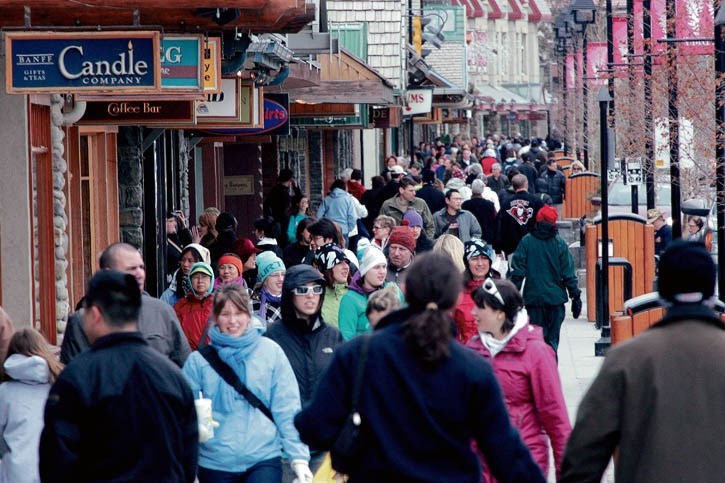The Town of Banff is looking to establish quotas for the number of festivals and special events on public and private lands in the tourist town, including farmers markets and sporting and recreation events.
At a finance and governance committee meeting Monday (April 11), council directed administration to solicit public feedback on a new festival and special events policy and return with a draft document for further debate on May 24.
Administration proposes to cap the number of days for events, including farmers markets, seasonal markets and craft fairs, sporting and recreation events, food and beverage events, and cultural exhibits, as well as put restrictions on the time of year certain events can be held.
“The proposed quotas we are putting in for all different events are not even close to being reached at this time,” said development planner Jennifer Laforest.
Banff has several long-standing special events like Melissa’s road race, Canada Day and Winterstart, but in recent years there has been growing interest in more events, including Christmas markets, yoga festivals, sporting demonstrations, wine and food shows and outdoor theatre performances.
Under the new draft policy, farmers markets would be limited to 26 days per year collectively within the community, with no leasehold occupying more than half of this total. That’s the equivalent of two farmer’s markets every week for three months.
Quotas would apply to other festivals and events as well. For example, up to 12 four-day sporting and recreation events would be allowed, but only four of those could occur within the busy summer months.
“We feel that’s an appropriate threshold for the time being, but if council does not think that’s appropriate, we are open to some discussion on that,” said Laforest.
Farmers markets and community fairs must meet ‘make it, bake it, grow it’ criteria, which means locally produced products made, baked or grown by the seller or immediate family of the seller, or by a member of a producer-owned cooperative.
Existing farmers market association guidelines allow for any produce from Alberta, but Banff’s draft policy indicates products and services within a 500-kilometre radius of Banff would be allowed.
Franchises or distributorships would not be permitted at festivals and special events in Banff.
Councillor Stavros Karlos raised questions about what locally produced means.
“I consider the Okanagan Valley to be local produce because of Canada’s geographical challenges, but I don’t know if a t-shirt that is made and produced in Kamloops is local – and that’s where it starts to gets shaky,” said Karlos.
“My gut feeling is the citizens of this community will see produce and products as two very different things, particularly on the business side of things.”
As part of the new policy, all special events will require a business licence. Market organizers will require a market business licence, but individual vendors will not.
“Generally, all special events require a business licence, but there is some debate how business licences should apply to those events,” said Laforest.
Coun. Ted Christensen had some concerns with farmers markets, saying there needs to be a level playing field between established businesses who pay higher rents and business licence fees in town and the markets and fairs.
“If you spend $100 at the markets, you’re not going to spend it on Banff Avenue,” he said.
“That’s going to take away from discretionary spending from our established businesses in town.”
Karlos said he sees some special events such as farmers markets as a way to encourage innovation and entrepreneurship.
“I do believe farmers markets are an opportunity for people to seek new ideas with lower risk. Is that a good thing? Is that unfair to people who pay higher rents in a commercial landscape? Maybe,” he said.
“But I don’t for a second think that these market vendors are somehow making a killing or destroying traditional retail enterprises within the community. I don’t see anybody buying Mercedes by running a farmers market. I think it’s a lot of hard work and their margins are slim.”
Coun. Grant Canning said he did have initial concerns when the farmers market was relocated to the Bear Street parking lot, which is just a few doors away from his coffee shop, the Cake Company Cafe.
“I can say from personal experience, it had a negligible impact. My own personal fears I had never materialized,” he said.
“With that said, I fully understand some of the small businesses in this community, and in particular our grocery stores, have some concerns around these markets.”
Should the number of applications for events exceed the proposed quotas, officials say applications could be considered on a first-come, first-serve basis, or on the merits of the event, or perhaps a random lottery.
“In the unlikely event there should be more applications received than are available, we could default to a random selection draw, much like we’ve done for growth management and the solar incentive program,” said Randall McKay, Banff’s planning and development manager.




